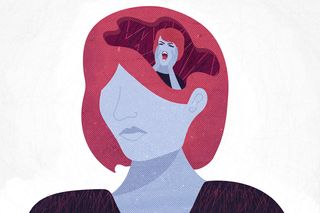
What It’s Like To Live With: Clinical Anxiety
“It’s as if everything is coming at you all at once — people, interactions with people, and tasks, and moods, and feelings.”

What It’s Like to Live With explores the stories of people who see and experience every day a little differently.
I’ve lived with anxiety for over four years – officially. There are some days that are particularly bad, because something happened – a stressful event, something I haven’t yet processed. I’ve experienced different types of symptoms over this time. In the early days, I felt a strange ache in my chest, and I woke up feeling unable to breathe. It was like a little drumming inside my ribs. Some other days it’s made it difficult for me to concentrate, and it’s affected how I process situations; I usually think something is worse than it is, and then it affects me to the point of physical exhaustion by the end of the day. A day with the symptoms could involve physical aches, an inability to see the world for what it is, fatigue, and a certainty that you have done something horribly wrong even when, in hindsight, you were fine.
I knew these symptoms came from anxiety, and therefore I could handle them. When I was in college, I had good counselors. What was particularly helpful was the talking portion of therapy – where the counselor goes over exactly why you think the world will end, and then calmly explains to you that it won’t actually end. Sometimes, it involves solutions; if it’s a short-term stressful thing, or a poorly managed interaction, one can often fix it by staying away from that thing, or limiting its impact on future days by minimizing it. Sometimes, the solution comes from the fact that you yourself have been doing something poorly, which makes you anxious. So you stop it, or fix it, or realize it.
The realizing really helps. In my experience, knowing what led to where you are now – what led to the tangle – helps to slowly untangle things. A good helper, a good counselor, is really good at that talking portion – knowing the right thing to say and identifying the faulty thought and where it comes from, to then say: This is how it is. And then that automatically helps me to think – of course. That’s how it is. And then I solve the problem.
Related on The Swaddle:
Depression, Anxiety May Take Toll on Health as Much as Smoking, Obesity
It’s not always this simple, of course. I’ve also had bad counselors. If they’ve been unable to talk and untangle properly, it’s led me to be irritated during the session. I feel like I’m doing too much of the explaining, virtually laying out my biodata and a play-by-play of the past three months, to tell them what might be the problem and how we might fix it. This isn’t helpful, of course. If I was so good at untangling, I would have done it myself. Hearing my own explanation just reinforces the sticky points. So, that’s not ideal.
What also does help is medication. With it, I feel like the sound in my head is a little bit softer. The sound outside gets muted, too. I realize when I’m on the medication exactly how things felt without it: It’s as if everything is coming at you all at once — people, interactions with people, and tasks, and moods, and feelings. The medication makes me feel more productive and calmer – because, of course, the things hurtling at me aren’t actually hurtling at me. It’s like I hear dim, soft waves, instead of loud rain on glass windows. I’m also happier because I no longer assume that everything I do has caused me to make my own life worse. I don’t over-analyze everything I say, a tendency that has the potential to cause my downfall professionally (if I’ve spoken to colleagues), personally (if I’ve spoken to friends), or at home (if it’s my parents I’ve talked to).
Sometimes, the sound outside is loud, and it’s not even immediately apparent that anxiety is causing this volume. The other day I experienced this strange and scary feeling. I was sitting at my desk. Nothing had happened recently to make me feel particularly anxious; I had gone days without worry or without needing any medication. I heard this sound, as if somebody called my name. It was a muted sound, yet I felt it nearby. I felt everything inside start to yell — no other word for it. My mind started to scramble, while I sat absolutely still, and searched desperately for the name to describe what I was feeling. I almost asked people around me if they could hear it, too. My body felt uncomfortable and the sounds were so loud.
They subsided. Slowly. But they were brand new: I had never experienced that before. Despite having had anxiety for as long as I have, and having names for the symptoms I felt, I had no name for this one. There is no way to predict or understand it entirely. There is not even anything that can quite make it better.
One thing does help, though: If you name the problem, you can usually soften its hold on you. If you’re like me, and you have a hard time admitting something is wrong, this part of the process is tricky. You’ve named it; finding the name makes it less scary. As the linguistic hypothesis says, you can experience something you’ve named. But you need to experience it: You need to accept how you’re feeling instead of the usual litany of – “nothing even happened; things are going so well for you; why are you making things worse for yourself?” And you need to keep having this conversation again and again. In my experience, anxiety is a constant process – yes, luckily it’s slow to show symptoms sometimes, but that’s not always true. All you can hope for is to find ways to dim the sound, even if it’s for a little while.
Shreya Ramachandran is a writer and researcher based in Mumbai. She has an undergrad and Master's degree in South Asian Studies.
Related


Kids Eat More Healthy Food If They’re Told Benefits They Can Relate To
